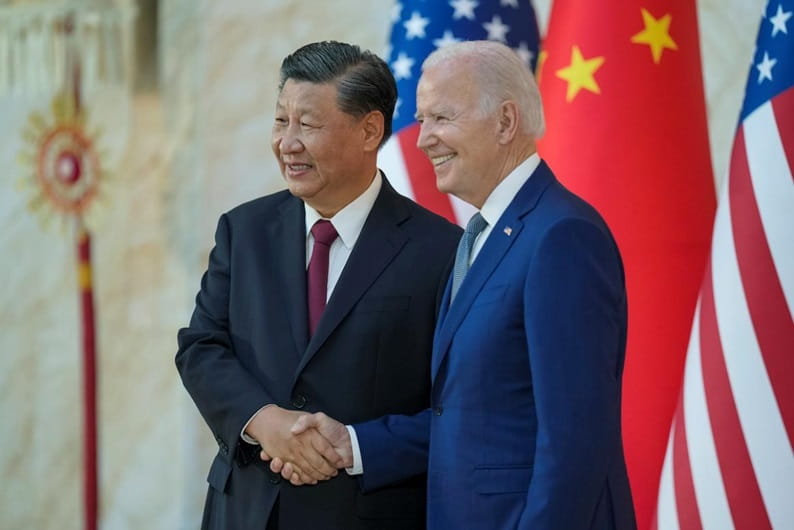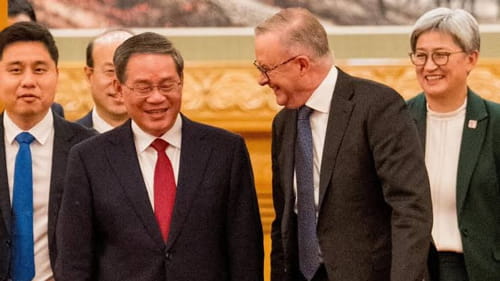
US-China Summit
Couched within the US-China confrontation lies the reality of regular high-level interactions between the US and China. The record of meetings is impressive and stands in sharp contrast to how America deals with Russia.
This article sheds light on an aspect that is less focussed on in Indian strategic literature which is the courting of China by all major nations of the world. If one narrative is that China is isolated and under international pressure, there is enough anecdotal evidence to prove the obverse. This is a lesson in how major powers deal with each other.
Of course, should there be, as is increasingly likely, a change in White House incumbency a few months from now, the picture may change from the last four years of the Biden Administration. Even the Chinese can at best only guess how a second Trump Administration will deal with China.
Notwithstanding the fact that we are standing at a possible cusp in China-US relations and major power relationships, it is instructive to look at how words and deeds have moved in the last four years when it comes to US-China interactions.
The record of high-level exchanges is impressive.
US - China Summitry
15 November 2022- First in person Biden - Xi Summit at the G20 Summit in Bali, lasting more than three hours. President Biden stated that “we share a responsibility to show that China and the United States can manage our differences, prevent competition from becoming anything ever near conflict, and to find ways to work together on urgent global issues that require our mutual cooperation”. President Xi stated that “We need to find the right direction for the bilateral relationship going forward and elevate the relationship.”
According to Chinese media reports, the “five-noes” promises made by President Biden to Xi were that the United States:
15 November 2023- Second in person Biden - Xi Summit in San Francisco (Woodside Summit), lasting more than four hours. According to Biden, the meeting was “among the most constructive and productive we’ve had”. Both leaders emphasized the importance of the bilateral relationship, with Xi calling it “the most important bilateral relationship in the world”.
2 April 2024- Biden - Xi phone call lasting 105 minutes. Both countries reviewed and encouraged progress on key issues discussed at the Woodside Summit, including counternarcotics cooperation, ongoing military-to-military communication, talks to address AI-related risks, and continuing efforts on climate change and people-to-people exchanges.
The two leaders tasked their teams to turn the “San Francisco Vision” into reality.President Xi Jinping stressed that the issue of strategic perception is always fundamental to the China-U.S. relationship, just like the first button of a shirt that must be put right. The two leaders welcomed ongoing efforts to maintain open channels of communication and responsibly manage the relationship through high-level diplomacy and working-level consultations in the weeks and months ahead, including visits by Secretary Yellen and Secretary Blinken.
"Intense competition requires intense diplomacy to manage tensions, address misperceptions and prevent unintended conflict, and this call is one way to do that," a senior US Administration official said[1]. The US aim is to address misperceptions and miscommunication, to avoid major surprises, to reopen defunct channels, and to more clearly signal to each other about our respective positions and interests. The US has sought to increase not just the quantity but the quality of their communication with China.
Since April 2024
Cabinet level exchanges and highest-level access have characterised US-China dealings in the last few months. These include visits by US Secretaries Blinken, Yellen, Raimondo and lengthy meetings between National Security Adviser Jake Sullivan and his Chinese counterpart earlier in 2022 and 2023 in various locations around the world.
Secretary Blinken visited Shanghai and Beijing where he underlined that “the two sides had in-depth, substantive, and constructive discussions on key priorities in the bilateral relationship and on a range of regional and global issues. The Secretary emphasized that the United States will continue to use diplomacy to make progress in areas of difference and areas of cooperation that matter to the American people and the world as part of responsibly managing competition with the PRC”
US NSA[2] Jake Sullivan has said -“A sustainable China policy is about holding in one’s head multiple truths at the same time and working iteratively to reconcile them. We are clear-eyed about the competitive structural dynamics in our relationship with the PRC. But we’re also keenly aware that the United States and the PRC are economically interdependent and share interests in addressing transnational problems and reducing the risk of conflict. We realize that efforts, implied or explicit, to shape or change the PRC over several decades did not succeed. We expect that the PRC will be a major player on the world stage for the foreseeable future. That means that even as we compete, we have to find ways to live alongside one another.”
USSecretary of Defence Llyod Austin met with the Chinese Defence Minister at the Shangri La Dialogue and remarked “there is no substitute for direct military-to-military talks between senior leaders. And there's no substitute for open lines of communication to avoid misunderstanding and miscalculations. As I've always said, dialogue is not a reward. It's a necessity. And so, I look forward to more talks with the PRC.”
All of this has been happening as Russia, a close friend and partner of China, is locked in a war in Ukraine. It would not have escaped Moscow’s notice that Beijing has not held back in talking to Russia’s primary adversary at a time of a complete breakdown of Russia’s relations with the US led NATO.
Russia is not too far behind
Just days after the Biden-Xi phone call on April 2, 2024 Russian Foreign Minister Sergei Lavrov visited Beijing on April 8-9 and announced that strategic interaction between Russia and China has reached an unprecedented level, with fifty percent of Russia’s imports currently coming from China. He described the Russia-China relationship as being essential for countering the US in Europe and Asia. Foreign Minister Wang Yi nuanced it by saying that the bilateral ties should always be based on non-alliance, non-confrontation and non-targeting of any third party. He said Russia and China will contribute to a multi-polar world as many voices of the Global South are rising.
As icing on the Chinese cake, on May 16 and 17, 2024 Russian President Vladimir Putin made a state visit to China for lengthy talks with President Xi Jinping.
And Europe as well
French President Macron paid a State visit to China in April 2023 to seek more business for French companies even as it was locked in a tense confrontation with China’s ‘no-limits’ partner Russia and tightening of European scrutiny of Chinese products and market access.[3] A few weeks ago, in May 2024, President Xi returned the honour by paying his own State visit to France, and Serbia and Hungary, with the Ukraine conflict still raging, not allowing, once again, China’s allegiance to Russia to stand in the way of doing business with Russia’s adversary. President Macron told President Xi in the presence of EU President Ursula von der Leyen that cooperation between EU and China could prove to be decisive.
The back-to-back annual nature of the China-France Summits in 2023 and 2024 puts the record of the disruption of India-Russia Summits in the same period to shame.
German Chancellor Olaf Scholz, another adversary of Russia, also paid a State visit to China in April 2024 to further emphasize the deep economic roots of the EU-China relationship, travelling to Chongqing, Shanghai and Beijing accompanied by a business and Ministerial delegation.
Put together, these developments show China to be in pole position in terms of engagements with the US, Russia and Europe.

PM Li Qiang with PM Albanese in Australia | Source : The Australian
A Quad member goes visiting - the case of Australia
Among the visits to China that has been lost in the din has been that of Quad and AUKUS Member and NATO ally, Australian Prime Minister Anthony Albanese to China a week before the San Francisco Summit in November 2023. This was the first visit by an Australian Prime Minister since 2016. Welcoming Prime Minister Albanese, President Xi said[4] China and Australia stood to become "trusting partners" and were on the "correct path of improving and developing relations". On his part, the Australian Premier was no less optimistic and said "I walk away from the meeting satisfied that we have positive engagement between Australia and China".
That the process of normalisation of China - Australia relations is underway has been left in no doubt with the return visit of Chinese Premier Li Qiang to Australia a few weeks ago in June 2024, the first such since 2017. His visit is expected to pave the way for President Xi Jinping’s first visit to Australia since 2014.
So, what is going on?
All of India’s major partners are talking to Beijing. Yet there is consternation when India makes an attempt to revive summit level contact, not with an adversary, but with a friend in Moscow. This is a world of double standards, and selective assertion of national security interests.
All roads do seem to lead to Beijing. The question is where does India’s road lead to. If we were to follow the above footsteps, it should also lead to Beijing.
(Exclusive to NatStrat)
Endnotes